Doctor's Wife Dies Days After Giving Birth to Their Baby — And He Called the Code with Her in His Arms (Exclusive)
Ten days after giving birth to the couple's second baby boy, Caitlyn Wilson died from childbirth complications
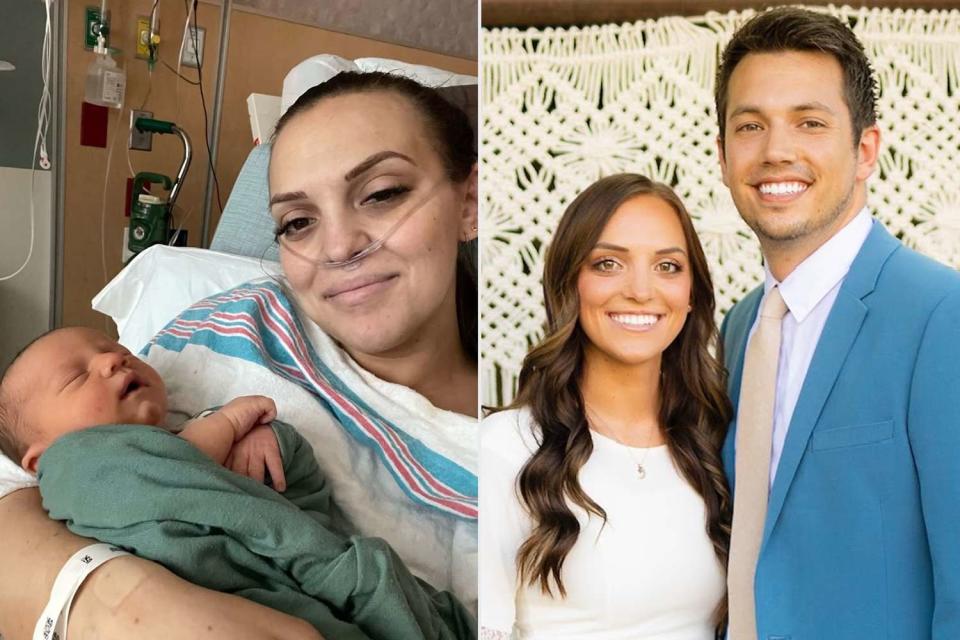
Courtesy of Jared Wilson
When Jared Wilson brought pregnant wife Caitlyn into the hospital to give birth to their baby boy Gabriel, he never expected he'd only get to bring one of them home.
On Dec. 12, Wilson dropped off his wife, 27, at the hospital in Buffalo, New York, for her scheduled induction and then went home for the day to take care of their then-1-year-old son Lincoln.
Later that night, Wilson, an anesthesiologist resident at the hospital, joined Caitlyn where everything "seemed to be going really, really well." She got her epidural around 1 a.m. the next morning and an OB resident came in to break her water shortly after.
"Positioning-wise, we hadn't been given any red flags. He'd come out just fine," recalls Wilson. "But when the resident broke her water and was trying to help position him, his arm was somewhat above his face, in a raised position, and directly behind it was the umbilical cord."
"She swooped one or the other and it resulted in his arm coming out into the birth canal and the cord getting pinched between his neck and his head and the wall as the fluid drained out. That leads to a condition called uterine cord prolapse, which has a really, really high mortality rate [for the baby] because he immediately starts to suffocate."
Never miss a story — sign up for PEOPLE's free daily newsletter to stay up-to-date on the best of what PEOPLE has to offer, from juicy celebrity news to compelling human interest stories.
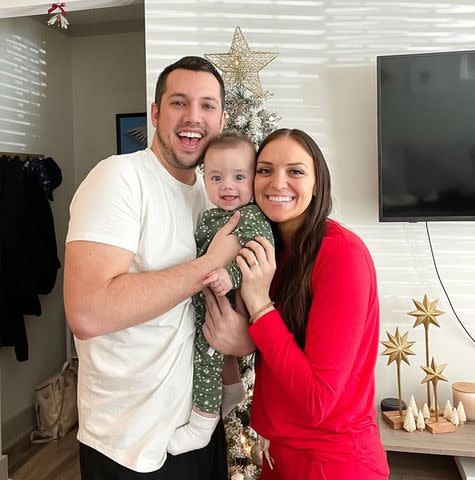
Courtesy of Jared Wilson
Wilson says the nurses and chiefs were then called in and the chief resident "put her hand basically all the way up to Cait's uterus and lifted Gabriel inside the birth canal off of his own cord and activated an emergency c-section."
"Things were happening really fast. At 2:02 a.m., I texted both sets of parents to pray for Caitlyn, because she was leaving the room to be wheeled down the hallway into the OR," he recalls. "At 2:17 the surgeons came back to me with pictures dated at 2:12 that Gabriel was out, he was healthy, he was screaming, all signs looked good. So in a matter of 10 minutes, they wheeled her down to the OR, opened her up and had a baby out."
Wilson explains that Caitlyn's complications came when doctors had to transition her to general anesthesia and intubate her in the OR as she still had feeling in her stomach because the epidural had only been placed about 20 minutes prior to her emergency c-section.
"One of the risks of general anesthesia always is significant aspiration of stomach fluids and contents to go back down into her lungs. That's increased for trauma in emergency situations, particularly in a pregnant woman who's been drinking water all day and has a big giant baby pushing up on her stomach and her lungs," he tells PEOPLE. "When they intubated Caitlyn, she had cups and cups of fluid, both water and stomach acid, come up and go down into her mouth. As they suctioned it out and placed the tube, the concern was how much of that ended up in her lungs."
"About two hours later, she gets wheeled back into the room and she's on oxygen, just a tiny bit. The surgery went well, the c-section went well. Of course, they sutured pretty hard and pretty strong because they didn't bother to separate layers or move things around. You just cut down to the baby and get the baby out."

Courtesy of Jared Wilson
"That increases her recovery time, and it's very difficult and very painful, particularly when you feel like you've swallowed a swimming pool because Cait was coughing really, really hard," Wilson continues, noting that prior to all this, Caitlyn had a mild case of bronchitis and still had "pretty inflamed and reactive" airways.
Caitlyn was having a hard time coughing strong enough as her "stomach felt like it was going to tear open."
"She got a lot out, and Gabriel was healthy and he was safe, and Caitlyn seemed safe and healthy," Wilson remembers thinking. "She looked like she was probably going to struggle for a little bit, and she started antibiotics to make sure she didn't get any kind of pneumonia from the fluid."
"But the plan was she's a healthy 27-year-old with no other health conditions whatsoever. People aspirate food in their lungs all the time when they get drunk and fall down, or they vomit and pass out. A healthy 27-year-old should bounce back really quickly."
Over the next 10 days, Wilson says some complications came up here and there which were "perfectly hidden by a perfect storm of aspiration, emergency surgery and pregnancy." At the same time, Caitlyn, who was still in the labor and delivery unit to have her oxygen monitored, was eager to get home to her babies.
"She was in obvious significant pain and her heart rate was high. She had swelling in her lower legs. She had this massive hormonal shift with a c-section and milk letdown and a baby. And of course, the stress of being in a hospital and being on oxygen and hooked up to these monitors and just wanting to go home with the baby."
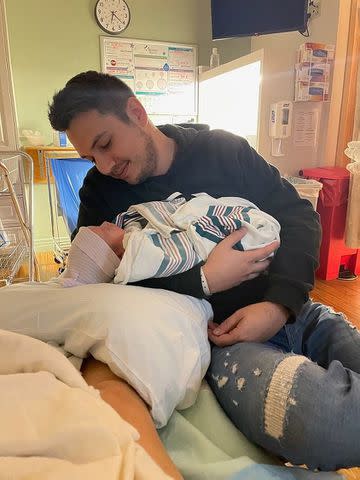
Courtesy of Jared Wilson
Not long after, Caitlyn progressed to the point where she needed more oxygen and was transferred to the intensive care unit (ICU). At that point, Wilson brought Gabriel home and Caitlyn was put on the "max support as far as oxygen goes that was non-invasive."
"Every day it was kind of the same. She would slowly progressively need a little bit more oxygen, but she was awake, she was talking to us and the pain was well controlled on the medications," Wilson shares.
On Dec. 21 — which also happened to be Wilson's 30th birthday — Caitlyn was intubated due to the inflammation in her lungs. "She wanted to have a little bit of rest and allow us to place a tube and have the machine to do the breathing for her," Wilson recalls. "She was tired of running this marathon and I could see it in her."
"Immediately things went wrong," Wilson recalls. "Up to this point, the only medications Caitlyn had been on were some low-dose pain meds and stuff for acid reflux and constipation. She was the healthiest person in the ICU."
"The minute we intubated and she desaturated, we could not keep Caitlyn up. The machine is designed perfectly to match human respiratory function and it couldn't do it," Wilson explains. "At the exact same time, labs, which had never really returned abnormal in nine days, suddenly started to show a double white count. She went from 10 to 40 in under eight hours, which is massive in the scope of things."

Courtesy of Jared Wilson
"At the same time that she decided to let other people help her so that she could rest, we suddenly lost her blood pressure and we couldn't keep it high enough. And because she was pregnant and she's prone to swelling because she's very leaky, all the fluid that they dumped into her, it doesn't stay within the vascular system. It starts to spread into the tissues and the muscle."
"The more fluid we put into her, if it starts to leak it can leak into the lungs, which is exactly what we don't want. But she's dehydrated, so we can't not give her fluid. Her blood pressure's low and she's lost a lot of blood, so we have to give fluids and blood," he continues.
"At the same time, we discovered that she had a minimum of two blood clots in her legs with evidence that there may have been a larger one that had traveled to her heart. And from all the ultrasounds that we had done, it looked like her heart was having obstructive shock. And the treatment for that is to not give fluids. But at the same time, due to the white count, she was in septic shock. And treatment for that is to give massive amounts of fluids. And then, of course, with blood clots it can only get worse, and so you also need to put them on blood thinners. She's barely a week out from an emergency c-section where she's already lost a lot of blood, so that's dangerous," Wilson explains.
"So up until the 21st, Caitlyn had been a healthy, talking, pale and tired, strong, amazing woman, and she tired out as anybody would. But the second she allowed others to help her and to take a rest from her own fight, 12 hours after we intubated, she coded for the first time," says Wilson. "And we got her back. And then somewhere around midnight to 2:00 or 3:00 in the morning, we started to see signs of organ damage that we just were not maintaining either oxygen, or the blood pressure, or controlling the sepsis."
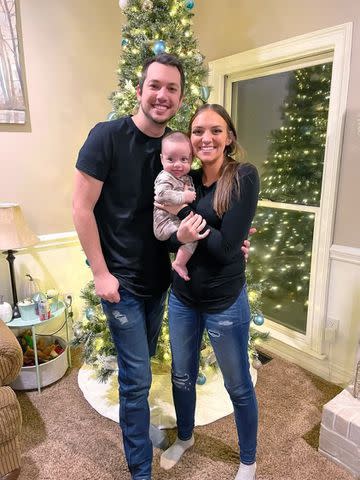
Courtesy of Jared Wilson
"We were trying to do literally everything we could for this 27-year-old and it wasn't working. The last ditch effort was to put her on dialysis to try to clean the acid and the white blood cells to help provide healthy blood to all of her organs. But in doing so, you take fluid away from the body and in septic shock, again, you need fluid."
On Dec. 22, at 6:56 a.m., Caitlyn coded for the second time. When Wilson got to her room around 6:59 a.m., Wilson says doctors had already been in the code the second time for about three minutes.
"They were just about to push more epinephrine and switch people doing compressions, and I just had to call the code," Wilson recalls, noting that a lot of his experience at the hospital was different as he's an anesthesiologist there.
"Because of my profession and other things, they allowed me to stay as a courtesy every night. And to be there at that time, and to be wearing the same uniform that a bunch of other doctors were, I walked into the room as they were providing compressions to Caitlyn and I asked them to stop, and I called the code," he says, getting emotional. "They turned off the machines, and then they left as I held Caitlyn. And that was it."

Courtesy of Jared Wilson
A few weeks after Caitlyn's passing, Wilson and the boys flew out to Utah to stay with Caitlyn's parents until they were able to have her funeral on Jan. 15. Wilson also shares his appreciation for his own parents, who "sold three houses and two vehicles" and "liquidated everything in their life" to leave Utah and drive to Buffalo to move in with him and his sons following Caitlyn's death.
"They started this process the day I told them Caitlyn might not make it," he says. "I hadn't even contemplated the idea of how I was supposed to work a 75-hour work week and make as little as a resident makes and take care of these two boys."
Looking back on his early days bonding with his newborn son Gabriel, Wilson says the experience was vastly different than with his firstborn.
"I watched [Lincoln] be birthed and see my wife hold him seconds after. And there's a bond that forms with something like that to see the motherly love. Gabriel, I didn't get to see that," he shares. "They delivered Gabriel to me in a bundle that night. He could have been anybody's baby. I hate to say that."
"Throughout the whole hospital course, we really hadn't had this time to bond with this baby the way that you would want to in those first 10 days. That happy period," he says. "When taking him home, I just remember crying the whole way."
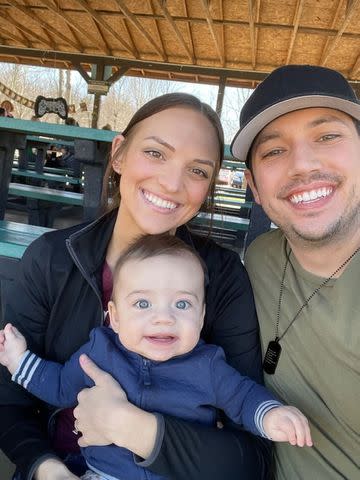
Courtesy of Jared Wilson
As he reflects on Caitlyn's experience, Wilson says despite the tragic outcome, he thinks of the nursing staff, physicians and everyone at the hospital as "angels and heroes in my eyes."
"Cait had the gold standard of tests, the gold standard of care," he says. "She required no real treatment besides oxygen for days, and then it just went south so quickly. But as an anesthesiologist, all of her complications are things that I think about with all of my patients every day doing the exact same procedures."
"She received the absolute best of care. And if I didn't know all of those things, I think there would be more to grieve in not understanding how this happened," he adds.
And while Wilson continues to mourn the loss of his wife, he tells PEOPLE he finds comfort in that he spent "three and a half years with this amazing woman."
"It's enough that it will last a lifetime, because as difficult as it will be to raise these boys as a single dad and a doctor, and they won't know their mom the way that they should, and they won't know of her love for them the way that they should, I'll have to work on how to do it," he shares.
"But true love, as sappy and as fairytale and cheesy as it sounds, is real, and it absolutely transcends any boundary of death, life, distance, or mom, that those three years are enough for me to live the rest of my life on. And they're enough that the boys will know of their mom."
"Her family loves, and misses, and honors her daily," Wilson adds. "We are working on so many ways to remember her and teach my sons about their mom so that they can know her."
To donate to Wilson and his family, visit the GoFundMe here.
For more People news, make sure to sign up for our newsletter!
Read the original article on People.

